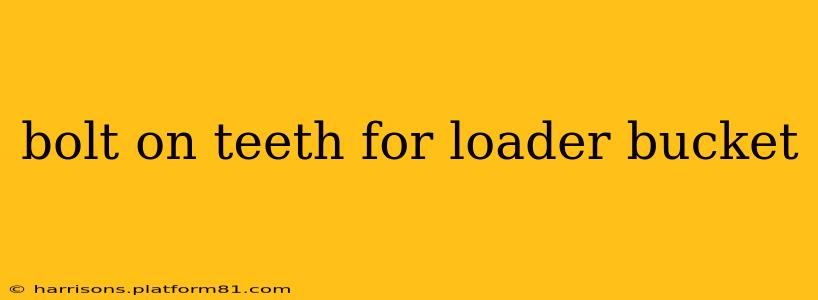Choosing the right bolt-on teeth for your loader bucket is crucial for maximizing efficiency and minimizing downtime. This comprehensive guide explores everything you need to know, from understanding different types of teeth to ensuring proper installation and maintenance. We'll answer frequently asked questions to help you make the best decision for your specific needs.
What are Bolt-On Teeth and Why Use Them?
Bolt-on teeth are replaceable cutting edges attached to the lip of a loader bucket. They are far superior to welded teeth because they are easily replaceable, saving time and money on repairs. When a tooth is damaged, you simply replace it instead of the entire bucket lip. This significantly reduces downtime and maintenance costs. They are designed to withstand the rigors of various applications, from digging and loading to demolition and material handling.
Different Types of Bolt-On Teeth: Finding the Right Fit
Several factors influence the choice of bolt-on teeth, including the material being handled, the application's intensity, and the type of loader. Here's a breakdown of common types:
- Standard Teeth: These are the most common type, offering a good balance of durability and cost-effectiveness. Ideal for general-purpose applications involving relatively soft materials.
- Heavy-Duty Teeth: Designed for tougher applications and abrasive materials, these teeth are significantly more robust and can handle higher impact forces. They are essential when working with rock, extremely hard clay, or other demanding materials.
- Side-Cutting Teeth: These teeth are designed for applications requiring extra cutting power, often used in trenching or digging operations where precise cuts are needed. They are characterized by a distinct sharpened side edge.
- Ground Engaging Tools (GET): This broader term encompasses various cutting edges, including bolt-on teeth. Understanding the specific GET system your loader uses is crucial when ordering replacements.
What are the different materials used in bolt-on teeth?
Bolt-on teeth are usually constructed from high-strength steel alloys that can resist impact and abrasion. The specific alloy composition influences the tooth's hardness, wear resistance, and overall lifespan. Common materials include:
- High Carbon Steel: A common choice offering good strength and wear resistance at a relatively lower cost.
- Alloy Steel: Offers superior strength and wear resistance compared to high carbon steel, making it ideal for harsh applications. Specific alloy compositions are tailored for extreme wear resistance.
- Cast Steel: Offers excellent durability and can be produced in complex shapes, suitable for specialized teeth designs.
How to Install Bolt-On Teeth: A Step-by-Step Guide
Proper installation is key to maximizing the life of your bolt-on teeth and ensuring safe operation. Consult your loader's manual for specific instructions, as the process may vary slightly depending on the make and model. Generally, the process involves:
- Removing the Worn Teeth: Carefully remove the worn or damaged teeth using the appropriate tools.
- Cleaning the Mounting Points: Thoroughly clean the mounting holes and surfaces to ensure a secure fit for the new teeth.
- Installing the New Teeth: Insert the new teeth into the mounting holes, aligning them correctly.
- Securing the Teeth: Tighten the bolts according to the manufacturer's specifications. Avoid over-tightening, which can damage the teeth or mounting points.
What size bolts do I need for my loader bucket teeth?
The size of the bolts needed will depend entirely on the specific make and model of your loader bucket and the teeth themselves. Always consult your owner's manual or the teeth manufacturer's specifications for the correct bolt size and torque specifications. Using the incorrect bolts can lead to unsafe operating conditions.
How often should I replace my loader bucket teeth?
The frequency of replacement depends heavily on the application, the material being handled, and the intensity of use. Regular inspection is crucial. Look for signs of excessive wear, chipping, or cracking. Replace teeth as soon as you notice significant damage to prevent further damage to the bucket lip and ensure efficient operation.
Where can I find replacement bolt-on teeth for my loader?
Replacement bolt-on teeth can be sourced from various suppliers, including agricultural equipment dealers, construction equipment suppliers, and online retailers specializing in parts and attachments. Always ensure you are purchasing teeth compatible with your specific loader bucket.
By carefully considering these factors and following proper installation and maintenance procedures, you can significantly extend the lifespan of your loader bucket and maintain peak operational efficiency. Remember to always prioritize safety and consult your equipment's manual for detailed instructions.
